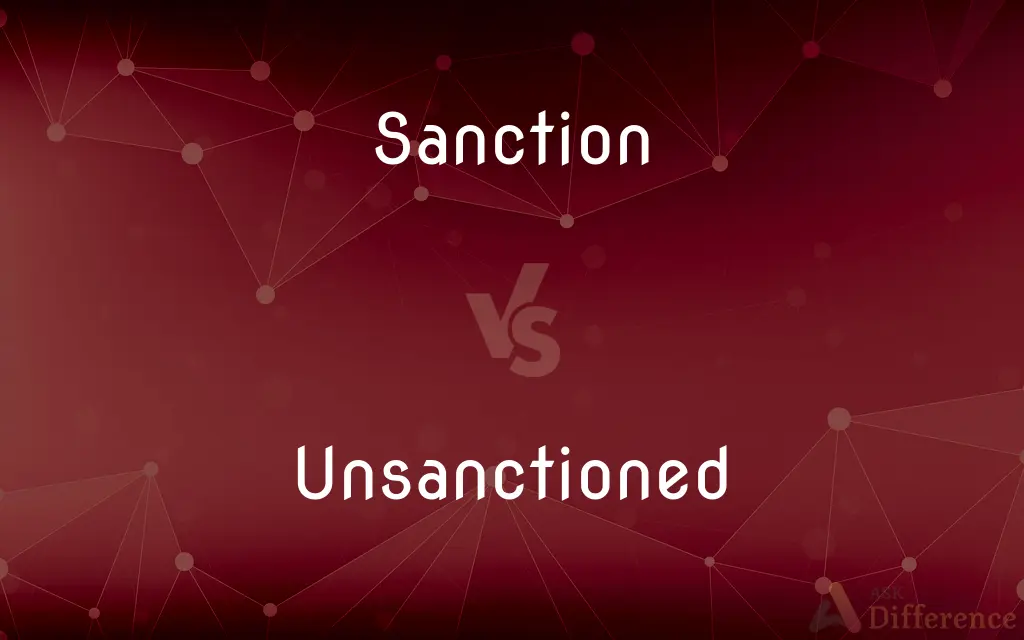Sanction vs. Unsanctioned — What's the Difference?
By Tayyaba Rehman & Maham Liaqat — Updated on March 25, 2024
Sanction involves official approval or a penalty for disobedience, whereas unsanctioned refers to actions or events lacking official permission or approval.

Difference Between Sanction and Unsanctioned
Table of Contents
ADVERTISEMENT
Key Differences
Sanction can mean either to authorize or to impose a penalty, depending on the context, emphasizing the role of authority in approving or restricting actions. It can refer to official approval for actions or policies, particularly in legal or international contexts. On the other hand, unsanctioned typically describes activities or behaviors that occur without official approval, often implying they are outside the bounds of accepted standards or regulations.
In international relations, a sanction is a tool used by countries or international bodies to penalize a nation for certain behaviors, aiming to compel compliance with international laws or norms. Unsanctioned, however, would describe actions taken by a country or entity that do not have the backing or approval of the international community, potentially leading to diplomatic tensions or conflict.
When it comes to events or competitions, sanctioned events are officially recognized and approved by governing bodies, ensuring they meet certain standards and rules. This official status often affects participant eligibility, record recognition, and adherence to safety protocols. Conversely, unsanctioned events lack this formal recognition, which may free them from certain restrictions but also from official support and legitimacy.
Within organizations, sanctioning a project or initiative means it has received formal approval, typically after review of its merits and alignment with organizational goals. This approval usually comes with support and resources. Unsanctioned projects, while they may proceed, do not have official backing, which can affect their access to resources, recognition, and success.
While sanctions, in the form of penalties, are used to deter undesirable actions or enforce norms, being unsanctioned in the context of actions or projects often reflects a lack of oversight or endorsement. This dichotomy highlights the importance of formal approval and oversight in various domains, from international relations to organizational management.
ADVERTISEMENT
Comparison Chart
Definition
Official approval or a penalty for disobedience.
Lacking official permission or approval.
Context
Legal, international relations, organizational.
Activities, events, or projects outside authority.
Implications
Implies authority and compliance.
Suggests independence or non-compliance.
Types
Can be positive (approval) or negative (penalty).
Generally negative due to lack of approval.
Outcome
Legitimacy, support, or deterrence.
Potential for controversy, lack of support.
Compare with Definitions
Sanction
Official permission or approval.
The council's sanction was required for the new policy to take effect.
Unsanctioned
Lacking formal endorsement.
He participated in an unsanctioned boxing match.
Sanction
Measures taken by a state to coerce another to comply with an international agreement.
The United Nations applied sanctions against the regime.
Unsanctioned
Activities that proceed without official sanction.
The unsanctioned research project went ahead despite warnings.
Sanction
A penalty for disobeying a law or rule.
Economic sanctions were imposed on the country following its actions.
Unsanctioned
Conducted without official permission.
The unsanctioned use of company resources was frowned upon.
Sanction
To give authoritative approval.
The CEO sanctioned the expansion of the research department.
Unsanctioned
Not officially allowed or approved.
The unsanctioned rally led to a significant police presence.
Sanction
To endorse or ratify an action.
The board sanctioned the merger after months of deliberation.
Unsanctioned
Operating outside the bounds of approval.
Unsanctioned vendors were selling merchandise outside the concert.
Sanction
Authoritative permission or approval that makes a course of action valid.
Unsanctioned
Not sanctioned; not approved by a sanctioning body.
Sanction
Support or encouragement, as from public opinion or established custom.
Unsanctioned
Without explicit official permission;
Unsanctioned use of company cars
Sanction
A consideration, influence, or principle that dictates an ethical choice.
Sanction
The penalty for noncompliance with a law or legal order.
Sanction
A penalty, specified or in the form of moral pressure, that acts to ensure compliance with a social standard or norm.
Sanction
A coercive measure adopted usually by several nations acting together against a nation violating international law.
Sanction
To give official authorization or approval to
Voting rights that are sanctioned by law.
Sanction
To encourage or tolerate by indicating approval
His colleagues sanctioned his new research.
Sanction
To penalize, as for violating a moral principle or international law
"Half of the public defenders of accused murderers were sanctioned by the Texas bar for legal misbehavior or incompetence" (Garry Wills).
Sanction
An approval, by an authority, generally one that makes something valid.
The whalers had been operating in the contested waters off the island with sanction from the Japanese government.
Sanction
A penalty, punishment, or some coercive measure, intended to ensure compliance; especially one adopted by several nations, or by an international body.
The United States enacted a new round of sanctions against the apartheid regime of South Africa.
Sanction
A law, treaty, or contract, or a clause within a law, treaty, or contract, specifying any of the above.
Sanction
(transitive) To ratify; to make valid.
Sanction
(transitive) To give official authorization or approval to; to countenance.
Sanction
(transitive) To penalize (a state etc.) with sanctions.
Sanction
Solemn or ceremonious ratification; an official act of a superior by which he ratifies and gives validity to the act of some other person or body; establishment or furtherance of anything by giving authority to it; confirmation; approbation.
The strictest professors of reason have added the sanction of their testimony.
Sanction
Anything done or said to enforce the will, law, or authority of another; as, legal sanctions.
Sanction
To give sanction to; to ratify; to confirm; to approve.
Would have counseled, or even sanctioned, such perilous experiments.
Sanction
Formal and explicit approval;
A Democrat usually gets the union's endorsement
Sanction
A mechanism of social control for enforcing a society's standards
Sanction
Official permission or approval;
Authority for the program was renewed several times
Sanction
The act of final authorization;
It had the sanction of the church
Sanction
Give sanction to;
I approve of his educational policies
Sanction
Give authority or permission to
Sanction
Give religious sanction to, such as through on oath;
Sanctify the marriage
Common Curiosities
What does it mean for something to be sanctioned?
It means the action or item has received official approval or authorization, or it refers to a penalty imposed for disobedience.
What are the risks of participating in unsanctioned activities?
Risks can include legal repercussions, safety concerns, lack of official support, and potential invalidation of results or achievements.
How can an action be both sanctioned and unsanctioned?
The term "sanction" can refer to approval or a penalty, depending on context. An action cannot be both approved and unapproved by the same authority, but it may be approved by one entity while being disapproved or penalized by another.
Can an individual sanction another individual?
In common usage, sanctioning typically involves an authority granting approval or imposing penalties, so individuals do not usually "sanction" each other in this formal sense.
What is an unsanctioned event?
An unsanctioned event is one that lacks official approval or recognition by governing bodies, often operating outside established rules or standards.
Can a government sanction another country?
Yes, governments can impose sanctions on other countries to penalize them for certain actions or to compel changes in behavior.
What is the difference between sanctioned penalties and unsanctioned actions?
Sanctioned penalties are authorized consequences imposed for wrongdoing, while unsanctioned actions are those carried out without official permission or approval.
Why do organizations sanction projects?
Organizations sanction projects to officially endorse them, allocating resources and support while ensuring alignment with goals and standards.
Why might someone choose to engage in unsanctioned activities?
Reasons can include seeking freedom from restrictions, pursuing personal or group interests not covered by sanctioned avenues, or challenging existing standards or authorities.
What is the role of approval in sanctioned actions?
Approval is central to sanctioned actions, providing legitimacy, support, and a framework within which the action is considered acceptable or legal.
What determines whether an action is sanctioned?
Official policies, laws, or regulations, and the decision of authorized bodies or individuals determine if an action is sanctioned.
Can a sanctioned action ever become unsanctioned?
Yes, if the initial conditions for approval change or if ongoing review deems the action no longer meets required standards.
What are the consequences of unsanctioned behavior in a professional setting?
Consequences can include disciplinary action, loss of privileges, and potential damage to professional reputation and career.
How are sanctions enforced?
Sanctions are enforced through legal and administrative mechanisms, which may include monitoring, penalties, and restrictions on activities.
How do international sanctions work?
International sanctions are tools used by countries or international bodies to penalize or exert pressure on nations to enforce compliance with international norms or agreements.
Share Your Discovery

Previous Comparison
Cacti vs. Cactus
Next Comparison
Mayor vs. GovernorAuthor Spotlight
Written by
Tayyaba RehmanTayyaba Rehman is a distinguished writer, currently serving as a primary contributor to askdifference.com. As a researcher in semantics and etymology, Tayyaba's passion for the complexity of languages and their distinctions has found a perfect home on the platform. Tayyaba delves into the intricacies of language, distinguishing between commonly confused words and phrases, thereby providing clarity for readers worldwide.
Co-written by
Maham Liaqat














































